In the heart of Co Kildare, renowned for its rolling green fields and equestrian heritage, two brothers are breathing new life into the world of handcrafted leather accessories.
CarveOn, a startup born in 2011 out of a humble garden shed, is on a mission to create high-quality leather goods inspired by the strength, elegance, and timelessness of Kildare’s equine culture.
Drawing from their father Jim’s deep roots in manufacturing, brothers Alan and Gary McCormack have blended tradition with innovation, crafting products that honour their local heritage and a commitment to lasting quality. Now, the company employs 19 people in the local area and have recently completed a four-day working week trial run.
“We were born and bred in Kill which was a small village at the time, it’s now become quite a populated place. Our father was in manufacturing and he used to make pressurised gas tanks. He passed away when we were in secondary school, which was a tough time.
“I originally wanted to go and study art but while he was passing away I was filling out my CAO forms. I was trying to go to NCAD (National College of Art and Design) but he was advising me against it and said, you don’t need anyone to teach you to be creative, but you need to know how to run a business,” says Alan.
Both brothers later went on to study business in college, Alan ended up specialising in business strategies while Gary did accounting and worked for KPMG as a tax consultant.
“We had a good history of working together, Gary was strong in accounting and was always able to coach me. Anything more qualitative, I’d always take the lead on. We tend not to work on the same thing, it was always complimentary. It’s worked out well as there is a good level of trust between us,” says Alan.
Working in finance just before the crash, Alan found it quite taxing in terms of the long hours, international travel and the intensity of the workload. He went to a craft fair in the RDS where he was inspired by a father and daughter setting up a stall.
“I spent a couple of years researching materials and ideas as to what I’d like to do. Myself and Gary started collaborating on ideas. We took a couple of trips to meet tanneries and various factories and suppliers to look at equipment and what we would like to produce,” says Alan.
While in college, Alan had a side business creating and designing logos.
“That was my original interest, lettering and brand design. It always fascinated me that my clients would haggle on the prices of the creative side when it came to designing the logo, but they never quibbled with prices when it came to the physical manifestation of the brand. It’s something that stuck with me, how proud people are of their brand,” says Alan.
Creating a startup
When Alan went to Gary with the business idea of personalised leather accessories. It took him by surprise how quickly he came on board.
“In my eyes, Gary had made it to where he wanted to be. I very much loved the creative side of things, but when it came to the actual mechanics of putting the business together, even though it was something I had studied, I wanted someone else to handle it. I thought I’d try my luck with him,” says Alan.
In November 2011, they began handcrafting a range of wood and leather tech accessories in a shed in Gary’s back garden.
At the time, money wasn’t plentiful, economically the country was in trouble and Alan wasn’t sure if the market was there for personalised items.
“We decided to do it for as little money as we could, to test the model. I studied web design so I built our first website, took our photographs and designed our products and packaging. Even if a company was quoting too much [for packaging], we got the materials and made it ourselves and bought the smallest machines we could,” says Alan.
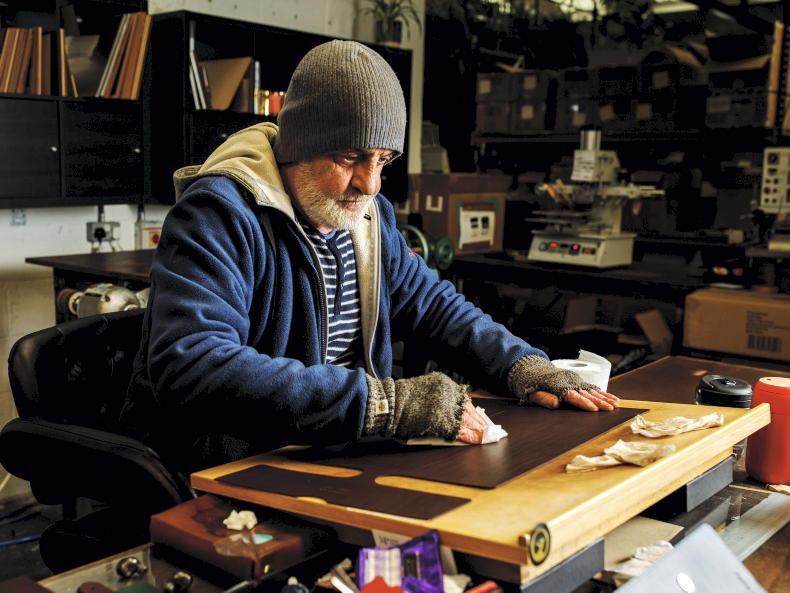
Paul McCarthy prepares and conditions leather products for customers at
the workshop. \ Philip Doyle
“When you’re at that starting point of setting up an enterprise that’s when everything is at its most expensive as you tend not to be dealing with the main supplier, there are lots of people in the supply chain.
“For example, our leather, was probably three times the price of what we pay now because we’ve cut out multiple people out of the chain. We work directly with the tanners and buy in bulk,” says Alan.
As Kill is an equine village, leather was a material Alan grew up surrounded by and always liked the high-quality luxury feel of it. The duo originally set about creating wood and leather products, but they moved away from wood in the early stages.
“Leather is such a nice material to work with, it’s interesting working with tanneries and trying to get the specification right for the type of goods that we were producing. We quickly phased out our wooden accessories and focused on leather. It’s a very nice workshop environment and it’s not too noisy,” says Alan.
The brothers design products that they want to use themselves and have a lot of fun doing it. They developed their e-commerce store and began marketing and selling their goods online. CarveOn now produces 26 luxury personalised items including wallets, belts, pens, coasters and notebooks.
Scaling up
In 2013, after some initial success and a lot of hard work, CarveOn met with the then Kildare County Enterprise Board, now Local Enterprise Office [LEO], who were impressed by their figures and business plan.
“They gave us an initial grant that enabled us to move from small equipment to larger equipment, and an old farm building unit in Kill. I think we got €10,000 in investment and that was a transformative moment in the business,” explains Alan.
Over the years they have had great support from LEO with employment grants, matched funding initiatives and support for digitalization of the business.
In 2016, they bought a 15,000 sq ft metalwork factory in Kilcullen and refurbished the space over six months. The workshop is their second home. It’s a place designed to encourage and celebrate creativity, innovation, tradition and friendship among staff, which also helps with attracting and retaining staff.
“We try and look after the team; it is almost like a small family to some extent. We’re able to offer people flexibility and understand when it comes to whatever is going on in their home life. We have great staff retention, a lot of the people have been here since the early days,” says Alan.
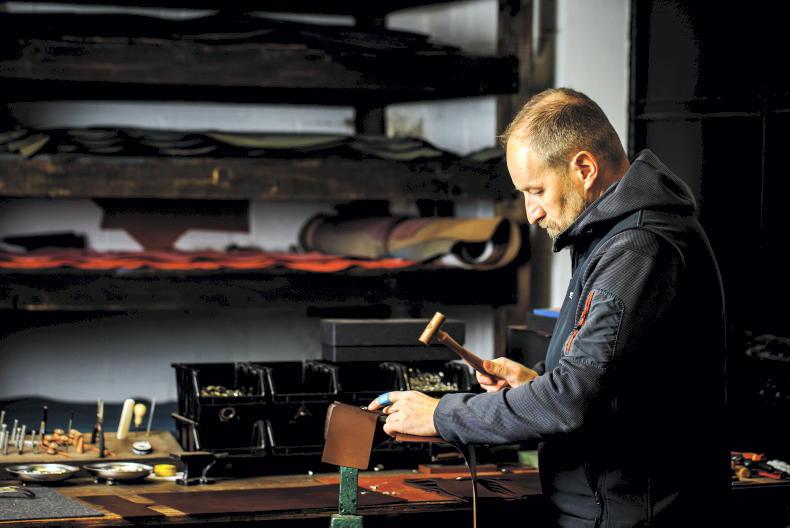
Leather craftsman Chris prepares leather product for customers at the CarveOn workshop in Kilcullen, Co Kidcare. \ Philip Doyle
After hearing about other companies trying a four-day working week structure, they decided to give it a go. Starting in July, they continued to remain open five days a week but staff can choose if they want to work Monday to Thursday or Tuesday to Friday.
“I think it can feel like a bit of a rat race sometimes and with the four-day week, people seem to be more relaxed and come into work recharged. Whatever is important on a Monday and Friday still gets done here and we haven’t seen any drop off in productivity,” says Alan.
About 50% of what CarveOn makes now leaves the country, and North America is their biggest export market. Having a presence online they also get orders from the UK, parts of mainland Europe, Australia and South Africa.
With demand for personalised items outside of leather, Gary and Alan started a second business with Robert Kennedy, a friend from secondary school. The sister company swag.eu applies the same quality ethos as CarveOn.
Alan and Gary now advise new companies setting up to try to get to that profitability stage.
“A lot of people are talented with craft, but it’s trying to monetise that. People work out their pricing based on the cost of the inputs, and it generally doesn’t leave anything for the business. We help companies get to that point,” says Alan.
See carveon.com
In the heart of Co Kildare, renowned for its rolling green fields and equestrian heritage, two brothers are breathing new life into the world of handcrafted leather accessories.
CarveOn, a startup born in 2011 out of a humble garden shed, is on a mission to create high-quality leather goods inspired by the strength, elegance, and timelessness of Kildare’s equine culture.
Drawing from their father Jim’s deep roots in manufacturing, brothers Alan and Gary McCormack have blended tradition with innovation, crafting products that honour their local heritage and a commitment to lasting quality. Now, the company employs 19 people in the local area and have recently completed a four-day working week trial run.
“We were born and bred in Kill which was a small village at the time, it’s now become quite a populated place. Our father was in manufacturing and he used to make pressurised gas tanks. He passed away when we were in secondary school, which was a tough time.
“I originally wanted to go and study art but while he was passing away I was filling out my CAO forms. I was trying to go to NCAD (National College of Art and Design) but he was advising me against it and said, you don’t need anyone to teach you to be creative, but you need to know how to run a business,” says Alan.
Both brothers later went on to study business in college, Alan ended up specialising in business strategies while Gary did accounting and worked for KPMG as a tax consultant.
“We had a good history of working together, Gary was strong in accounting and was always able to coach me. Anything more qualitative, I’d always take the lead on. We tend not to work on the same thing, it was always complimentary. It’s worked out well as there is a good level of trust between us,” says Alan.
Working in finance just before the crash, Alan found it quite taxing in terms of the long hours, international travel and the intensity of the workload. He went to a craft fair in the RDS where he was inspired by a father and daughter setting up a stall.
“I spent a couple of years researching materials and ideas as to what I’d like to do. Myself and Gary started collaborating on ideas. We took a couple of trips to meet tanneries and various factories and suppliers to look at equipment and what we would like to produce,” says Alan.
While in college, Alan had a side business creating and designing logos.
“That was my original interest, lettering and brand design. It always fascinated me that my clients would haggle on the prices of the creative side when it came to designing the logo, but they never quibbled with prices when it came to the physical manifestation of the brand. It’s something that stuck with me, how proud people are of their brand,” says Alan.
Creating a startup
When Alan went to Gary with the business idea of personalised leather accessories. It took him by surprise how quickly he came on board.
“In my eyes, Gary had made it to where he wanted to be. I very much loved the creative side of things, but when it came to the actual mechanics of putting the business together, even though it was something I had studied, I wanted someone else to handle it. I thought I’d try my luck with him,” says Alan.
In November 2011, they began handcrafting a range of wood and leather tech accessories in a shed in Gary’s back garden.
At the time, money wasn’t plentiful, economically the country was in trouble and Alan wasn’t sure if the market was there for personalised items.
“We decided to do it for as little money as we could, to test the model. I studied web design so I built our first website, took our photographs and designed our products and packaging. Even if a company was quoting too much [for packaging], we got the materials and made it ourselves and bought the smallest machines we could,” says Alan.

Paul McCarthy prepares and conditions leather products for customers at
the workshop. \ Philip Doyle
“When you’re at that starting point of setting up an enterprise that’s when everything is at its most expensive as you tend not to be dealing with the main supplier, there are lots of people in the supply chain.
“For example, our leather, was probably three times the price of what we pay now because we’ve cut out multiple people out of the chain. We work directly with the tanners and buy in bulk,” says Alan.
As Kill is an equine village, leather was a material Alan grew up surrounded by and always liked the high-quality luxury feel of it. The duo originally set about creating wood and leather products, but they moved away from wood in the early stages.
“Leather is such a nice material to work with, it’s interesting working with tanneries and trying to get the specification right for the type of goods that we were producing. We quickly phased out our wooden accessories and focused on leather. It’s a very nice workshop environment and it’s not too noisy,” says Alan.
The brothers design products that they want to use themselves and have a lot of fun doing it. They developed their e-commerce store and began marketing and selling their goods online. CarveOn now produces 26 luxury personalised items including wallets, belts, pens, coasters and notebooks.
Scaling up
In 2013, after some initial success and a lot of hard work, CarveOn met with the then Kildare County Enterprise Board, now Local Enterprise Office [LEO], who were impressed by their figures and business plan.
“They gave us an initial grant that enabled us to move from small equipment to larger equipment, and an old farm building unit in Kill. I think we got €10,000 in investment and that was a transformative moment in the business,” explains Alan.
Over the years they have had great support from LEO with employment grants, matched funding initiatives and support for digitalization of the business.
In 2016, they bought a 15,000 sq ft metalwork factory in Kilcullen and refurbished the space over six months. The workshop is their second home. It’s a place designed to encourage and celebrate creativity, innovation, tradition and friendship among staff, which also helps with attracting and retaining staff.
“We try and look after the team; it is almost like a small family to some extent. We’re able to offer people flexibility and understand when it comes to whatever is going on in their home life. We have great staff retention, a lot of the people have been here since the early days,” says Alan.

Leather craftsman Chris prepares leather product for customers at the CarveOn workshop in Kilcullen, Co Kidcare. \ Philip Doyle
After hearing about other companies trying a four-day working week structure, they decided to give it a go. Starting in July, they continued to remain open five days a week but staff can choose if they want to work Monday to Thursday or Tuesday to Friday.
“I think it can feel like a bit of a rat race sometimes and with the four-day week, people seem to be more relaxed and come into work recharged. Whatever is important on a Monday and Friday still gets done here and we haven’t seen any drop off in productivity,” says Alan.
About 50% of what CarveOn makes now leaves the country, and North America is their biggest export market. Having a presence online they also get orders from the UK, parts of mainland Europe, Australia and South Africa.
With demand for personalised items outside of leather, Gary and Alan started a second business with Robert Kennedy, a friend from secondary school. The sister company swag.eu applies the same quality ethos as CarveOn.
Alan and Gary now advise new companies setting up to try to get to that profitability stage.
“A lot of people are talented with craft, but it’s trying to monetise that. People work out their pricing based on the cost of the inputs, and it generally doesn’t leave anything for the business. We help companies get to that point,” says Alan.
See carveon.com








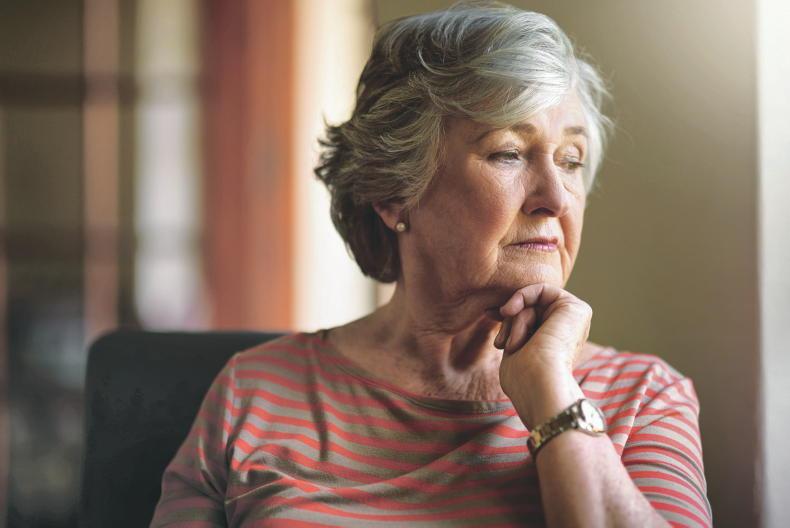
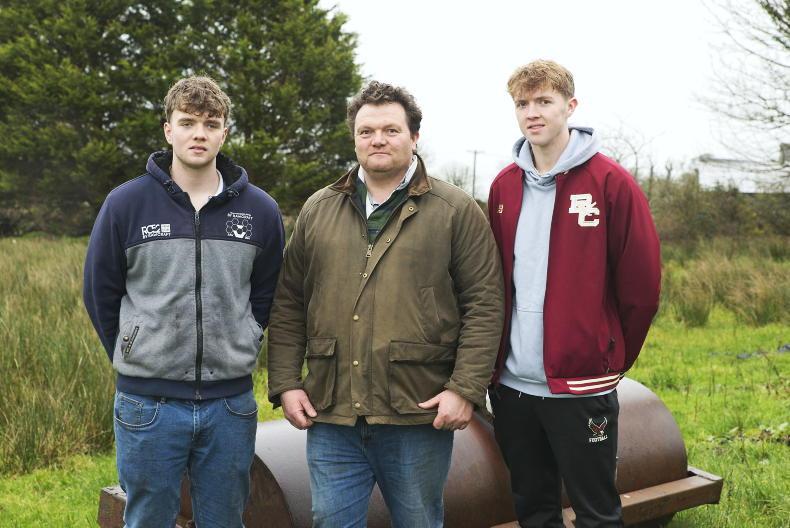
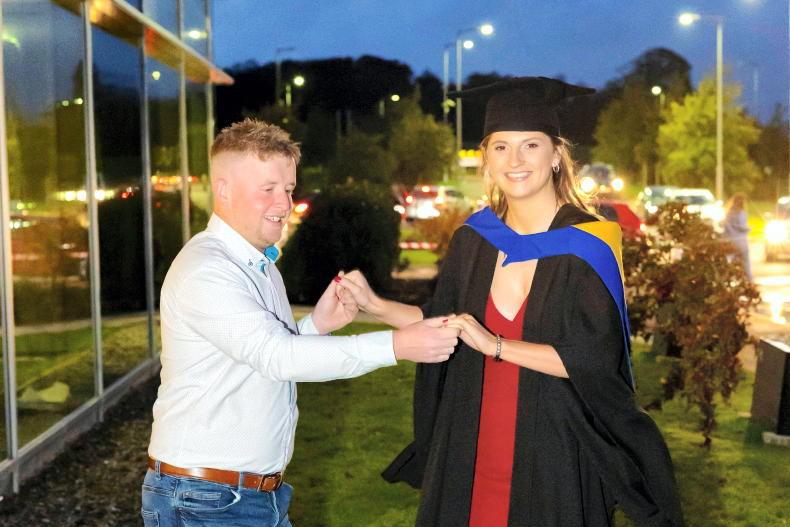
SHARING OPTIONS